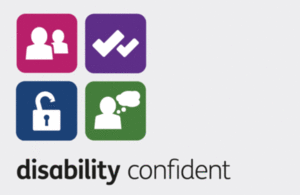I was overjoyed when I was informed that I had been successful at the paper sift stage of the promotion process. I spent hours and hours on my application and so was glad that my investment had paid off. I attended my interview and gave it my best. The result wasn’t what I had hoped it would be, but as a disabled person I am used to barriers. I am used to giving my heart and soul with little recognition in return. That’s what I have come to know of life in policing.
However, what I was and still am happy about, is that my request for reasonable adjustment was agreed and accommodated. It wasn’t your typical reasonable adjustment either. I was able to evidence (using a rather lengthy report packed full of documentary evidence) that a particular element of the assessment criteria put me at a disadvantage.
I was prepared to have to argue my point….but it just wasn’t necessary. The request was made and the very next day it was accepted, much to my surprise! It couldn’t have been easier.
But I have come to question, even with the adjustment, was I still at a disadvantage?
The answer is, I honestly don’t know. At the time I was just pleased that a disadvantage had been acknowledged. I think ultimately, I was just grateful to have had an opportunity.
But should I be ‘grateful’ though?
What is important to note though is that if you don’t ask – you don’t get. If you don’t try – you will never succeed.
I know that many disabled officers feel that which ever way you cut it, the police promotion process just isn’t fair towards those with a disability.
Some feel disadvantaged when gaining the evidence to apply in the first place. Some feel lacking in opportunity, often over looked by Senior officers in favour of those who are ‘fully able’. Others feel that competency based interviews disadvantage them due to their condition, such as those with Autism, Dyslexia or Dyspraxia.
So are they right? Are police promotion and recruitment processes fair? More importantly, are they fair for disabled people?
I won’t give an opinion as I will likely be accused of being ‘bitter’ or ‘sucking up’ in preparation for the next process, depending on which way my opinion leans.
However, if you were to ask the College of Policing for a view, I’m sure the answer would be “yes” it is a fair process.
But, if you asked disabled people in policing, I bet the overwhelming majority would answer “no”.
I don’t feel I have grounds to complain. I requested reasonable adjustment and was granted it. This is more than I had ever imagined I would get.
But then I wonder, am I content because I was given more than I was expecting I would? I had prepared myself to stand up for my entitlement to adjustment and was frankly relieved when it wasn’t necessary.
But was the adjustment actually enough?
I read a great article this week by @Alice_Kirby where she had the opportunity to interview Jeremy Corbyn about disability in politics.
Miss Kirby writes that only 2 of 650 MPs self declare as having a disability, yet if politics were to be truly representative of the people of the UK – 1 in 5 would have a disability.
By the very same logic surely 20% of policing should therefore be made up of disabled people? The numbers currently stand at no more than around 5%. Wasn’t it once said that “the police are the public and the public are the police…”?
Shouldn’t the police be representative of the communities they serve?
There has been a concerted drive from the top by the Prime Minister, (formerly as Home Secretary) to increase BME representation in policing and at every rank. So why too is this not being driven for disability in policing when disabled people are so clearly underrepresented? Why is this not driven in politics also?
Addressing Under representation
So how can this issue of under representation be addressed (assuming someone has the desire to address it)? Or should it even be addressed at all?
I personally believe it should. Disabled people in policing are being left behind without the opportunity to keep up with everyone else. The only commitment we have seen so far on this issue is actually the complete reverse – the desire to reduce the numbers of disabled officers through measures such as Limited duties and Capability Dismissal.
It may sound a contradiction, but my belief is that most disabled people are generally no less able than non disabled people (except in extreme cases). We are merely less able at what are considered to be ‘conventional’ activities, but in fact we are often more able at ‘non conventional’ activities.
An example to illustrate my point – look at the fantastic GB Paralympic team. Are they less able than their able bodied team mates? Or are they just more able at ‘other things’? Could Andy Murray win a Wimbledon title if he had to move around the court in a wheelchair (a less ‘conventional’ way to play tennis)?
So where does the problem lie in police promotion and recruitment?
Well it seems to be in that point I have illustrated – disabled people are ‘able’ at different things in different ways, meaning that conventional promotion and recruitment criteria and formats can put disabled people at a disadvantage when competing against their non disabled colleagues. This is because policing often tests the things that we (disabled officers) are less able to do (than non disabled officers).
This naturally results in disabled people not qualifying for recruitment or promotion processes.
The problem of ‘qualifying‘ for a promotion or recruitment process is sometimes overcome in other sectors, not so far removed from policing, by the use of ‘Guaranteed interview schemes’ (GIS) as run by many places such as the Home Office and even MI5! If a candidate states they are disabled and wish to be considered as part of the GIS, they will at the very least be guaranteed an interview….if they meet the minimum criteria.
Fair enough. Introduce it to policing and then you have one barrier firmly kicked down.
But, the GIS only gets you as far as the interview or assessment process, where you are then expected to compete against non disabled colleagues on your ability to do ‘conventional’ activities.
The interview or assessment itself is usually competency based, requiring the candidate to provide structured answers set against a list of criteria.
I have recently heard this process described in another way;
“…...(the interview) requires the applicant to answer complex ‘low-baller’ questions and mold one’s evidence to fit on the turn of a dime…..which can present a challenge to those with a number of conditions”, says John Nelson, the Chair of the National Police Autism Association.
So how can we overcome this problem?
Interestingly, Miss Kirby’s article talks about ‘disabled only shortlisting’, an opportunity for disabled people to compete against other disabled people only, something Labour’s Jeremy Corbyn said he was not adverse to in politics and that apparently the Lib Dems have committed to introducing by 2020 (but why wait so long?).
I can visualise this working in policing like so:-
A promotion process is looking for 5 candidates. Therefore, 1 position (20% representation) could be competed for in a ‘disabled only’ promotion process, whilst all non disabled candidates compete for the other 4 positions in a separate process. The ‘disabled only’ process could then be tailored appropriately to fit individual needs of those shortlisted.
Could it work? There is only one way to find out!
I do like this idea but I can’t ever see it getting of the blocks in policing. What better way to guarantee representation from disabled people and in a process which makes the chance of success much more achievable, virtually eliminating the possibility of discrimination.
Personally, I’m torn between whether or not this would be a good thing.
Some may argue that this type of idea is demeaning to disabled people as it indicates they could not possibly be successful against non disabled candidates. I can guarantee others will firmly ask “why disabled people should be given such an advantage”?
The counter question to that however is; “Why are disabled people still put at such a disadvantage?”
Isn’t it about time we stop worrying about offending people and start doing what is right for the good of everyone in society, the public we serve?
Would disabled people, (who account for about 20% of our population don’t forget) rather be represented by disabled or non disabled politicians? People who actually understand them.
Would the welfare reforms have so badly affected disabled people if the decisions were made by disabled politicians? I very much doubt it!
Likewise, would victims of disability hate crime, or any crime for that matter, rather be helped by an officer who can empathise with them because they too are disabled, or an officer who has never known what it is to be disabled?
We can fix representation in policing, but it won’t be achieved through treating people “fairly”, it will be achieved through treating people according to their needs.


